Much like perfectly fluffed pillows, hot tea, and soft sweaters with too-long sleeves, there is something almost magical about cozy games. The developers at Phoenix Labs recognized this mystical phenomenon--and the extraordinary healing powers these games possess--and thus began work on Fae Farm, an intimate-yet-grand farm sim that they call "a love letter to farming and life sim games."
Announced during September 13's Nintendo Direct, Fae Farm is a vibrant-looking Switch exclusive that combines dungeoneering, exploration, magic, combat, foraging, mining, farming, fishing, and curating a cute n' cozy home into an adorable-looking multiplayer experience. Built with cooperative play in mind, the game allows up to four players to drop in and out of the game seamlessly as they team up to turn an old rundown farm into a proper home. While this story might sound familiar to all you Harvest Moon and Stardew Valley fans out there, Fae Farm celebrates these hallmarks while also delving even deeper into elements such as combat and exploration, allowing players to don fairy wings and venture throughout the land of Azoria rather than solely stick around their homestead.
Ahead of the Direct, I spoke with Katie De Sousa, the creative director of Fae Farm, as well as the game director, Isaac Epp, and asked them a few questions about Phoenix Labs' upcoming game. From gushing about their desire for a Ocarina of Time-inspired farm sim and revealing how many hours they have put into Animal Crossing, to outlining the importance of inclusivity in Fae Farm and explaining their patented "Cozy System," De Sousa and Epp had a lot to say about the Spring 2023 release.
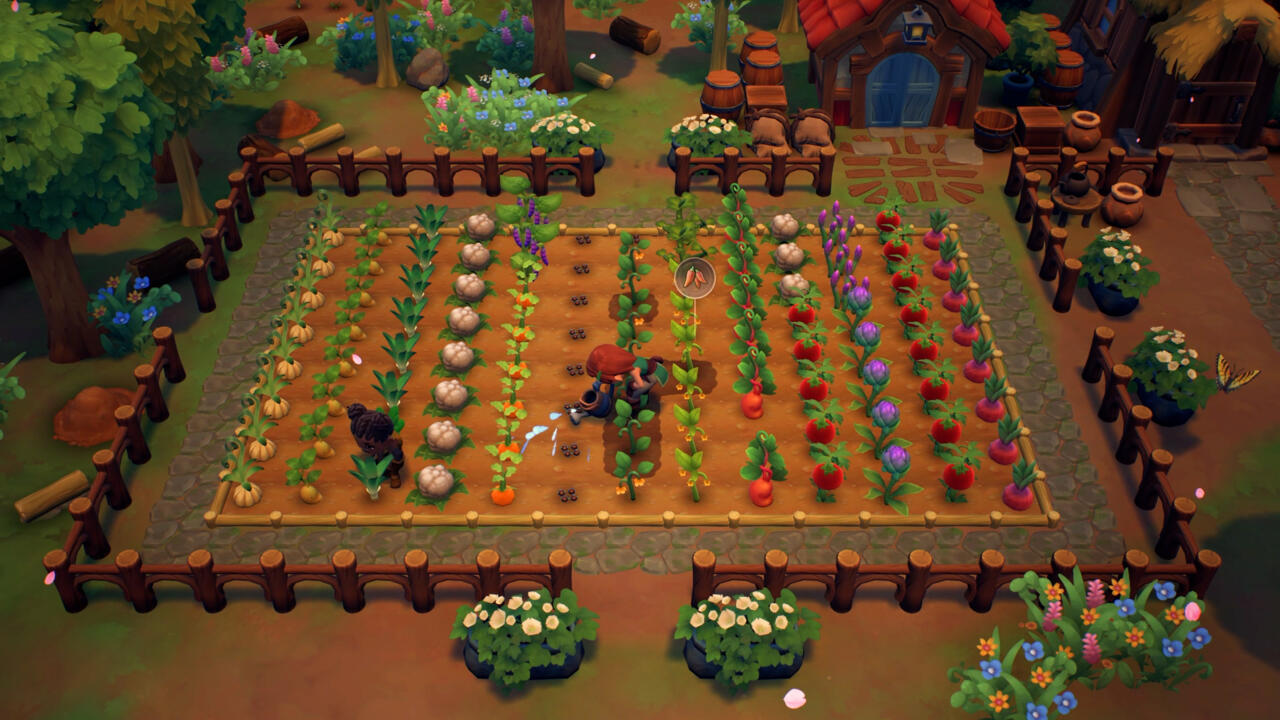
GameSpot: So one of the best parts of a farm sim or cozy game is kind of the comforting rhythm that people can fall into. What does that look like in Fae Farm? Can you describe the day-to-day gameplay?
De Sousa: I think there's a few manifestations of how that loop can happen for people, depending on their preferred play style. We have a couple vectors for progression, daily cycles of activities that you could do. And they're quite broad, and players can pick and choose the ones that they really like to engage with, and avoid the ones that maybe they're not a fan of.
So the overall loop is that you have your farm. What you're trying to do is--it's very small and overrun when you first get it--and so you want to build bigger gardens and harvest more crops and clean stuff up and decorate it really nicely and build a bigger home. And there's a coziness system that relates to the player's interior decorations, which relates to the player's health bars.
And so it's a lot of systems pointing to other systems, but your loop is to get your house cozier, so you're stronger, so you can go out and get more materials, whether that's foraging, or going mining, or combat, or critter-catching, or fishing. Or the stuff you like to do could just be farming. [So you] bring that back, get your house cozier, and then continue that loop, like going out, coming home, improving stuff…
And then there's a linear narrative that will walk you through all of the different environments of the game--all the different kind[s] of main characters in the story. So that's a little ramble-y, but [it has] this feel of a game that's quite sandbox-y in nature. So not exactly linear, but there is a linear thread at least.
Is there a sort of day-night cycle in it?
De Sousa: Yeah. We stuck with the traditional sort of like the day-night rollover of a farm sim, where you have your end-of-day summary of all the stuff you accomplished, the things that you sold, any kind of level-ups, and that kind of stuff.
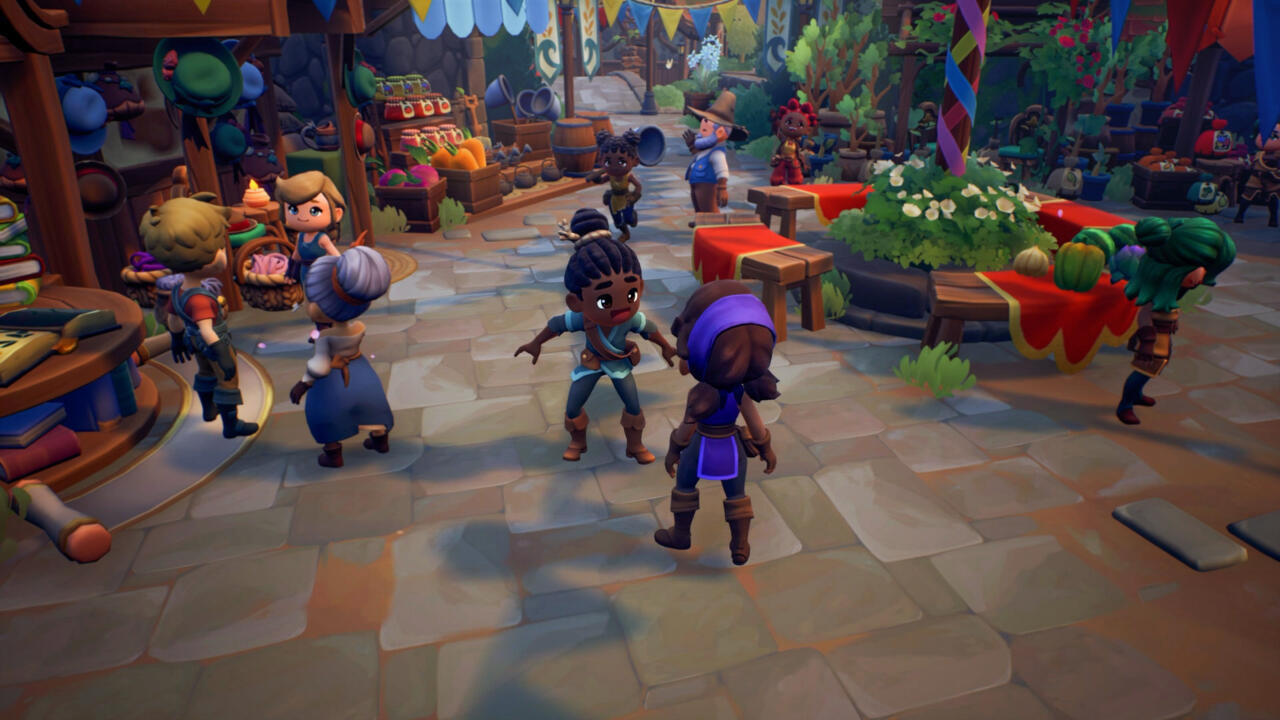
Fae Farm's press release mentioned that the game is a love letter to your favorite farm sims and cozy games. Can you share a few of the ones that inspired you and how so?
De Sousa: So for me, Harvest Moon was kind of my original and that sort of [sparked], "Oh, there's farm sims. That's a thing you can do. How cool." Another one of my really foundational games was Ocarina of Time, and I always wanted to live on Lon Lon Ranch. So I spent a lot of time there with horse racing opponents and stuff like that. And I was like, "Oh man, I would love to have a Zelda game, but you have a farm on it. And you're just going out to the dungeons and coming back home." So that was the original inspiration for me, in terms of where that came from. But Isaac is bringing in all sorts of awesome [experiences.]
Epp: Yeah, I mean, I've got well-over 800 hours in Animal Crossing. So that one is definitely top tier for me, in terms of finding a really cozy experience that has quirk and personality and feels unique and special. And I'm one of those people that spends a lot of time decorating, making sure everything looks just the way I want it, and all my outfits right. I'll also spend 20 hours in a character creator if you let me. And I think another one that jumps out to me is Spiritfarer. That was a real gem of an experience, and had just a lot of good heart to it. It felt cozy and personal. And I think that personal angle is a thing that I just love to see more of in games.
What are some of your favorite features in Fae Farm?
Epp: There are a lot of things in the game that I like a lot. I think the Cozy System is super unique and novel.
Can you describe that a little bit for me?
Epp: Yeah! So as you decorate and develop your homestead, you're going to get access to more things you can decorate inside your home. And as you make that space more cozy, it will give you more health, more stamina, more mana. And that's really the way to--I mean, beef up your characters is maybe the wrong way of phrasing it for this kind of a game--but it's how you get yourself to be stronger and more durable. And all that is just through being cozy, which I think is just awesome.
De Sousa: Some equivalent would be if you're familiar with the comfort system in Valheim, or The Sims' decorating moodlet buffs. It's similar to that.
Were there any other features you wanted to discuss?
Epp: One other thing that jumps out in my mind is just the intuitive approach to standard chores for this type of game. Whether you're farming or harvesting or whatever, it's made so that it's not dumbed down in any way--it really takes some of the fiddly tediousness out of the flow of doing those activities. And as you progress in the game and you get access to more magic, you gain efficiencies that are also really fun and they feel very fulfilling to do. There's a Water Bloop [spell] that is particularly fun. I'm sure you'll fall in love with it like we did.
De Sousa: A lot of farm sims tend to just go straight to automation. They're like, "Oh, it's a lot of friction to do all of these activities. So let's just get you to stop doing them. Here's a machine, that'll do it for you." We're like, "What if we could just make it more efficient, but also way more fun and have these be big moments for the player?" So [with] Isaac's like, Water Bloop spell--it was in the trailer--you basically summon a giant ball of water that splashes on all of your crops. And it's very fun to do that. So instead of plunking a sprinkler down and just forgetting about it, now you have this fun thing you can do and feel powerful every day. So that's sort of the philosophy that we are going for [with] all of the sort efficiency upgrades and stuff for the player.
Epp: It's important to have the game not play itself, and let the players still play the game.
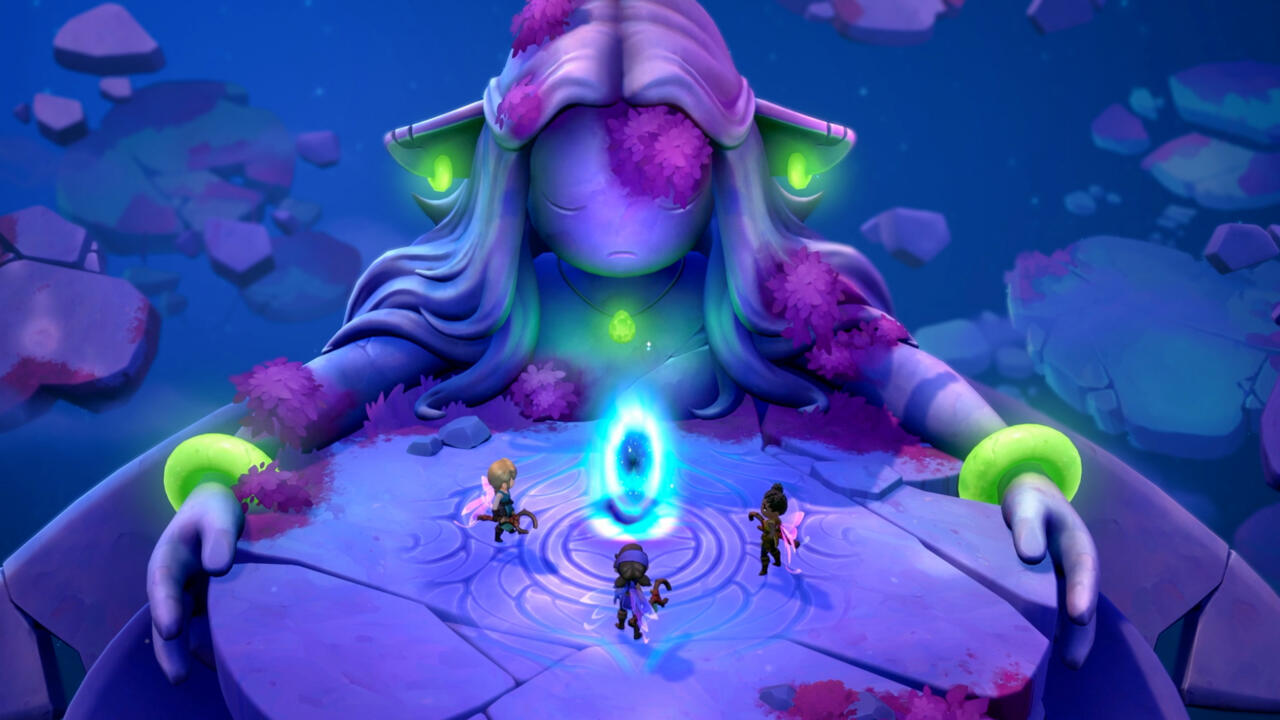
In the press release, you described the game as built for a cooperative experience, or built with it in mind. How is the game built for that cooperative experience and then are people who play it by themselves still going to have a good time?
De Sousa: That's a great question. So a lot of how we built the cooperative experience is mostly looking at adventure-craft, survival-craft genre games, and pulling in the things that are done successfully in those games as well as other multiplayer games. And that tends to be picking roles and specialties. So if one person's like, "Hey, I'm going to be the farmer. So I'm just going to farm--just go hard into that and a few other skills--and you can go do the mining and be in the dungeons and do all the combat stuff. And then, we'll work together and get stuff done faster by doing it that way."
So it's more sort of picking roles and specialties to help each other go faster. But all of that stuff is still accessible to a person who wants to play single-player. And they're not limited in, "You can only get to level blah." So you can only pick so many things. You can just level up all of your skills and have access to all of that eventually. It'll take you longer, probably, single-player, but there's still some balancing that we're going to think about doing to make it go a little faster, if you are only one person playing.
Will each person have their own kind of house and farm, or is it a shared thing?
De Sousa: So at first, when you first arrive, you have a shared home and one plot of land. As you guys progress through the game, you'll unlock new plots of land and that will eventually lead you to a point where you have four houses, so everybody can have their own space.
And then as far as more about the multiplayer experience as a whole, was there anything more you wanted to share?
Epp: I feel like there's an aspect to this, that in this post-pandemic world, getting opportunities to play with your friends and family is a gift. And getting to do that in an atmosphere that isn't just about trying to kill each other, makes it a lot more appealing to a broader swath of people within that familial-friend space. And I'm really hoping that people will be able to just sit in their living room together and play. And that might be the most magical way to play the game, is sitting next to your friend or family while you're doing it. Or maybe you have friends or family that are all the way across the country, and you can get together every once in a while to go work on the farm together.
Can four people play on one console or is it four separate consoles?
Epp: It's four consoles.
De Sousa: Yeah. Fae actually started as a side project that I was working on with my husband in our spare time and then Phoenix Labs was like, "Oh, we'll actually incubate this project for you and see where it goes." But part of the original desire that I had was that I stay connected to my friends through games, and I don't actually have any of my close gaming friends in the city that I live in. They're just all over North America.
So we play like, Valheim and V Rising and Minecraft, and all the fun, survival, craft-based, shared-world games where you can progress together and build a home base together--it's just so satisfying. And I wanted something like that to play with my sister, but she's a nurse and she has a toddler, so she's not going to play Valheim with me. So I was like, "But you'll play something on a Switch! You'll play Animal Crossing. So how do I get this experience in a package that's accessible to someone who has a toddler hanging off of them?" And so that's sort of like, the original intent and the hope to share it with family members who are a little excluded from other kinds of video games.
I love Animal Crossing, but joining a friend's game--going and getting the invitation code and all of that--is a bit complex. Is Fae Farm any simpler?
Epp: Oh, yeah. Animal Crossing had choices that they made and bless them, they are hard choices to make when you're making video games. So this is not a critique at all, but there's a lot of friction and there are a lot of weird states that you could get into where you're just sitting and watching animations play forever, waiting to play with your friends. And if a lot of people were on your island, it could create some, just really catastrophically, confusing situations. We're trying to not do that and, wherever possible, just allow people to drop in, drop out. It should be fairly seamless, and it will be using the friends that you have through Nintendo and through the Switch. So we're not coming up with our own friend system that you have to manage inside of their already existing ecosystem.
De Sousa: Something that we were considering when we were thinking about multiplayer and how it would work was, "So we want to host servers? Do we want to have the player host their own server and then people would connect to it?" And that's what we ended up going with just because hosting servers externally also was a lot of extra friction for players because a lot of this audience doesn't know what that means. We don't want to have to force that burden of knowledge on them just to be able to play. So if they're like, "Oh, I'm going to start a farm. Come to my farm." That should be all that they have to know, ideally.
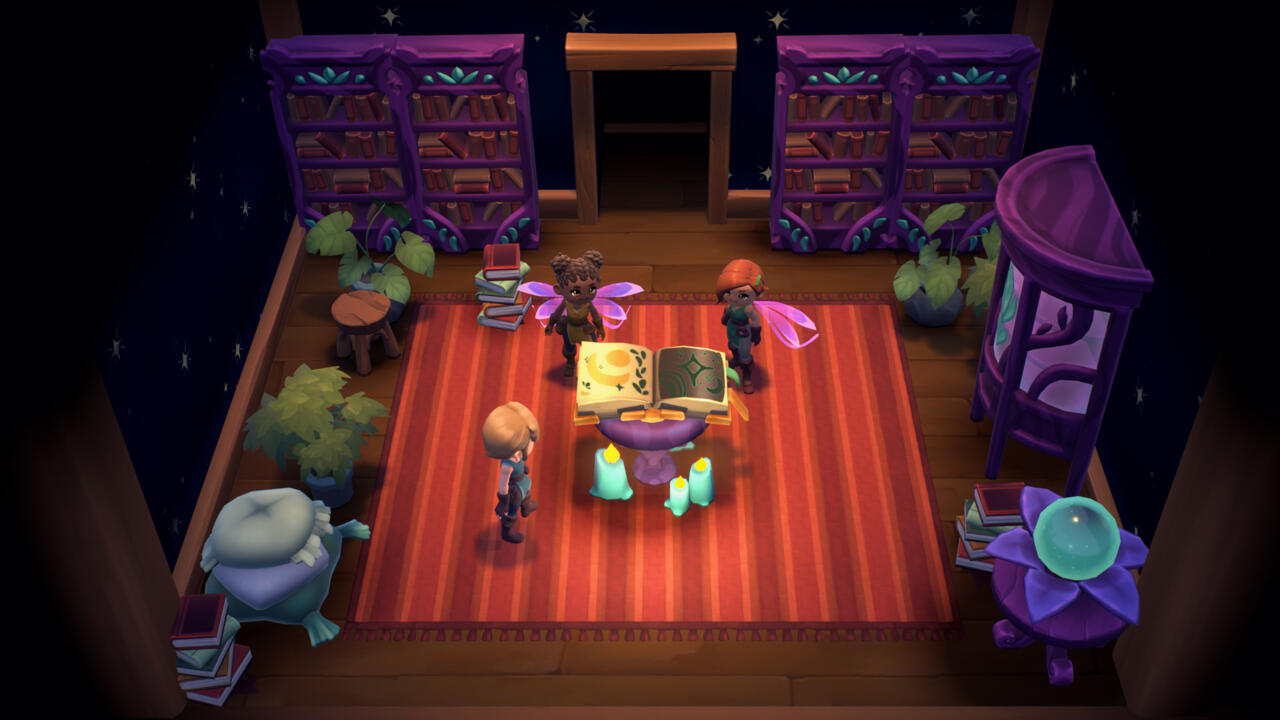
When you have those four players, is it locked where, in order to play the game, you need all four people there? Can one person leave and a new person come in? How does that work?
Epp: You can play with any or all of those people at once. If someone needs to leave, because their toddler's fussy, they can totally do that. Or if you want to [say], "I'll be back in an hour after I go make a sandwich," it's all totally fine. And if you want to invite someone else, they can pop in and play too. It's pretty flexible in that way.
De Sousa: Yeah. We're hoping to allow a broader number of people to be able to be on, let's say the Whitelist for the farm save that you have, and four of those people could play at once. Just so that if you have a game with four people and you want to bring a couple of their friends to see what you've done [or] see how you've decorated with your friends, they can come check that out at some point.
Is it one farm per save or Switch?
De Sousa: We want to have multiple saves on your Switch, so not like Animal Crossing where you're limited to one island. This would allow players to be like, "I want to have one farm where I progressed with this group of friends, one farm where I progress with this other group of friends, and I want maybe a single-player game for myself." Because everybody has more than one Stardew Valley save.
What types of steps are you taking to make sure the game is inclusive and accessible?
Epp: I want any game I work on to allow the players to find themselves in it. I think that is really important. And I'm glad that it's getting talked about now. It is important. Our character creator, as an example, will let you choose any look you want, any clothes you want, you can select your pronouns, and be who you are.
Amazing. And what about accessibility?
De Sousa: In terms of mechanic design, we're aiming to have things be a lot simpler for players to access. So the reason why we went with a locked camera is to allow people who don't have the capacity to control so many things at once to be able to play the game and have a good time and not be overwhelmed by, "I have to control my character and my buttons and my camera?" So things like that just to make it a step easier for people.
Epp: There are a lot of input things that we're trying to avoid wherever possible, too. Things like button mashes are really difficult for a lot of people, especially if they have limited dexterity in their hand. So instead, making that a press action or maybe a brief hold so that it's not quite as physically difficult, is a piece of it. All of our interface design is done purely with values. So in practicality, that turns out everything is black and white when it's all designed and laid out and we make sure that it works perfectly there before any color is applied to it, so that it basically makes it really colorblind effective. No matter how you perceive the colors, it'll work for you.
PR representative: Yeah. Just to jump in real quick, I think maybe too--as we get further along in development, maybe closer to launch--we'll have specific accessibility features that we can give you.
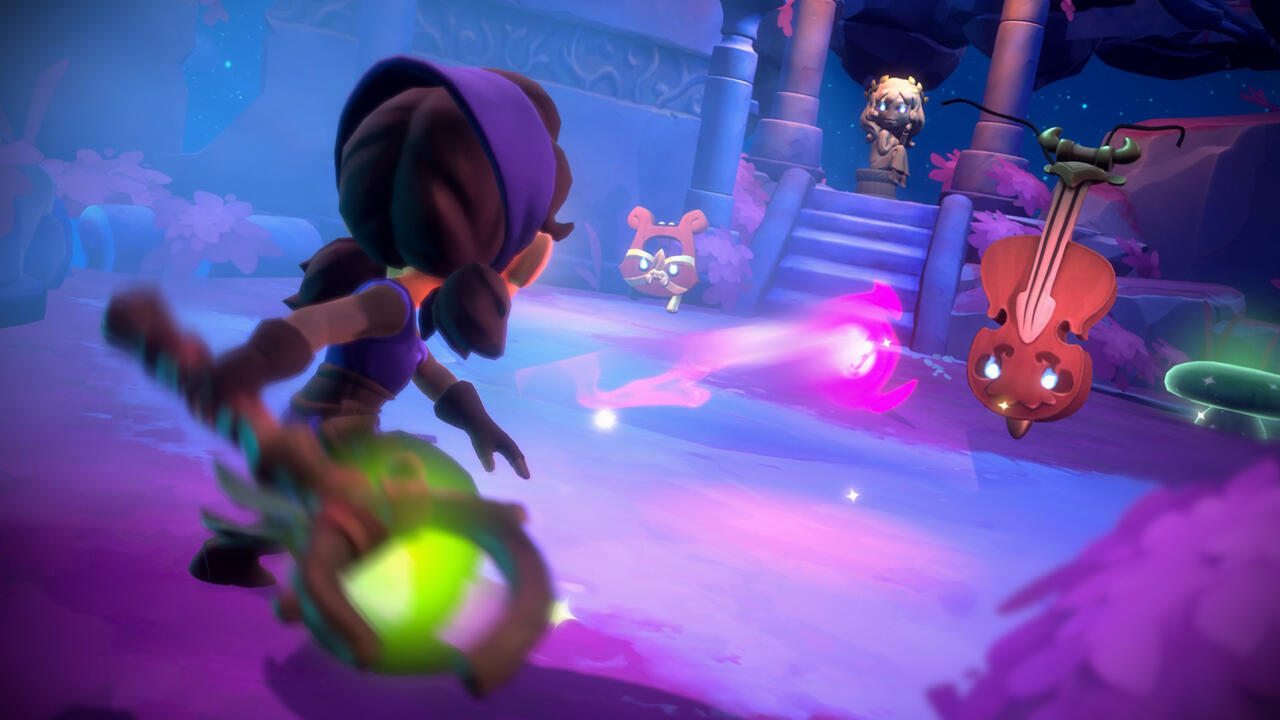
Perfect. Was there anything else that you wanted to talk about?
Epp: The art style is wonderful. Yeah, you got exposed to it in the trailer, but when you're running around it, it feels cared for. Every time you're running over a rock or you're going around a tree or you're jumping on top of a house, you can tell the people that made the game, spent time looking at that one spot and making sure that it felt right
De Sousa: For the art style specifically, the goal we had in mind was to make the world feel like you were in a storybook, not so much hitting you over the head with it, where it's, "Look at all the parchment textures and all of the drawing lines." It's sort of like in the background, you just feel like you're in a magical place. You just fell into a storybook and this place is real, but it's like, it's a little bit abstracted--a little bit simplified, a little bit rounder, a little bit more friendly, a little bit more vibrant, a little bit more playful than a real world. And we also wanted to make sure that it looked handcrafted. So as Isaac mentioned, that feeling you get, when you look at the environment and you're like, "Oh, this place was crafted with a lot of love, that sort of comes through in that handcrafted quality."
